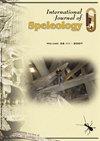The physical activity of Spanish speleologists: accomplishment of recommendations and differences by sociodemographic variables
IF 1.3
4区 地球科学
Q3 GEOSCIENCES, MULTIDISCIPLINARY
引用次数: 0
Abstract
Outdoor adventure activities are becoming more popular due to their potential health benefits, although there is little scientific information on speleology as a physical activity (PA). The purpose of this study is to expand the scientific evidence in this field in two ways: (a) describe the PA performed by speleologists, taking into account the variables of interest such as gender, age, education, speleological level, participation in ‘Alpine’ explorations and body mass index (BMI) and (b) identify how far the World Health Organization’s (WHO) PA recommendations were accomplished (i.e.,150 min of moderate-intensity aerobic PA or 75 min of vigorous-intensity aerobic). A cross-sectional study was conducted on 436 speleologists (305 men, 130 women). The participants completed an electronic survey on PA after which a descriptive analysis and cross-sectional pairwise comparisons (Mann–Whitney U and Kruskal–Wallis tests) were performed on the non-normal data. The mean metabolic equivalent (MET)-minutes/week was 4070.80 (±3078.80) for total PA, 1937.65 (±1992.39) for vigorous PA, 827.66 (±1049.81) for moderate PA and 1304.87 (±1031.65) for PA walking intensity. 73.4% of the participants met the PA recommendations. Nonparametric tests revealed differences by gender, age, educational level and speleological expertise. Women, the middle group age, doctorate and vocational training students, and beginners were less active than their counterparts. The findings provide important contributions towards the positioning and understanding of speleology as a sport and physical activity practice.西班牙洞穴学家的身体活动:社会人口变量的建议和差异的实现
户外探险活动由于其潜在的健康益处而越来越受欢迎,尽管关于洞穴学作为一种体育活动的科学信息很少(PA)。本研究的目的是通过两种方式扩展该领域的科学证据:(a)描述洞穴学家进行的PA,考虑到感兴趣的变量,如性别、年龄、教育程度、洞穴学水平,参与“高山”探索和体重指数(BMI),以及(b)确定世界卫生组织(世界卫生组织)PA建议的完成程度(即150分钟中等强度有氧PA或75分钟活力有氧)。对436名洞穴学家(305名男性,130名女性)进行了横断面研究。参与者完成了一项关于PA的电子调查,之后对非正态数据进行了描述性分析和横断面成对比较(Mann–Whitney U和Kruskal–Wallis检验)。总PA的平均代谢当量(MET)-分钟/周为4070.80(±3078.80),剧烈PA为1937.65(±1992.39),中度PA为827.66(±1049.81),行走强度为1304.87(±1031.65)。73.4%的参与者符合PA的建议。非参数测试揭示了性别、年龄、教育水平和洞穴学专业知识的差异。女性、中年人、博士生和职业培训生以及初学者的活跃度低于同龄人。这些发现为定位和理解洞穴学作为一项运动和体育活动实践做出了重要贡献。
本文章由计算机程序翻译,如有差异,请以英文原文为准。
求助全文
约1分钟内获得全文
求助全文
来源期刊

International Journal of Speleology
地学-地球科学综合
CiteScore
3.10
自引率
23.10%
发文量
12
审稿时长
>12 weeks
期刊介绍:
The International Journal of Speleology has the aim to get cave and karst science known to an increasing number of scientists and scholars. The journal therefore offers the opportunity to all scientists working in and on karst to publish their original research articles or their review papers in an open access, high quality peer reviewed scientific journal at no cost. The journal offers the authors online first, open access, a free PDF of their article, and a wide range of abstracting and indexing services.
 求助内容:
求助内容: 应助结果提醒方式:
应助结果提醒方式:


